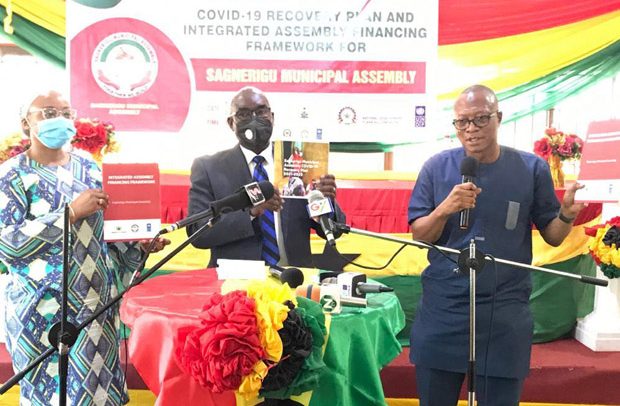Dr. Kodjo Esseim Mensah-Abrampa with Madam Angela Lusigi at the launch in Sagnarigu
The National Development Planning Commission (NDPC) and the Ministry of Finance (MoF) in partnership with the United Nations Development Programme (UNDP), have supported five metropolitan, municipal and districts assemblies (MMDAs) to launch the COVID-19 Recovery Plans and Integrated Assembly Financing Frameworks.
This is intended to help them to recover from the impact of COVID-19 and build resilience against local and external shocks.
The beneficiary assemblies are Kumasi Metropolitan Assembly, Sagnarigu Municipal Assembly, Ketu South Municipal Assembly, Sefwi Wiawso Municipal Assembly and Kassena Nankana West District Assembly, in the Ashanti, Northern, Volta, Western North and Upper East regions of Ghana, respectively.
The launch took place at the Sagnarigu Municipal Assembly in the Northern region.
The COVID-19 Recovery Plan is guided by the national recovery framework and based on four pillars such as local economy, people, infrastructure and governance. The development of the IAFFs is part of Ghana’s efforts to lead in the implementation of the Addis Ababa Action Agenda on Financing for Development. Over GH¢181 million is estimated to be released for the implementation of the recovery strategies and the sources of funds will include internally generated revenue, district assemblies’ common funds, public private partnership arrangements and donor support.
The implementation of the plans is also expected to speed up the COVID-19 recovery process and accelerate progress towards SDGs attainment, and ultimately build a wealthy, inclusive, sustainable, empowered and resilient Ghana (a WISER Ghana).
Director General of the NDPC, Dr. Kodjo Esseim Mensah-Abrampa, addressing participants, said the development of the COVID-19 Recovery Plans and IAFFs falls in line with the objectives of the Ghana COVID-19 Alleviation and Revitalization of Enterprises Support (Ghana CARES) programme.
“Our response to COVID-19 is a strategic one using the case of the most affected to leverage ideas to respond to national challenge. We have also placed the COVID-19 plans as part of sustainable endeavour created by the Ghana CARES (Obaatanpa) programme. The path created by this initiative was to ensure that we left no one behind in the journey towards creating opportunities and prosperity for all Ghanaians,” he said.
Angela Lusigi, UNDP Resident Representative in Ghana, stated that the IAFFs provided concrete measures for mobilizing the financing required to achieve the ambitious Sustainable Development Goals (SDGs). The frameworks’ strategies comprise consolidating existing revenues, philanthropic financing, diaspora financing and private-public-partnerships among others.
According to her, the bottom-up approach to delivering the Integrated National Financing Frameworks targets directly citizens at the local level of governance and puts SDGs at the heart of local government financing.
“UNDP and the UN System in Ghana are committed to bringing collective resources and expertise to support Ghana’s efforts towards SDG attainment at all levels. With thanks to the UN Joint SDG Fund and contributing partners, we are helping to accelerate SDG progress and COVID-19 recovery through integrated national financing frameworks.”
She also said it was transformational because it put SDGs at the heart of local government financing, building on successful efforts to integrate SDGs in national and local planning and budgeting processes.
“The government’s commitment to establish SDG Investor Maps and SDG investment fairs and to connect to business and the diaspora can only enrich these efforts,” she said.
UNDP Resident Representative assured that UNDP would continue to support the government’s effort and work as part of the entire United Nations System to bring collective expertise, experience and resources to support the achievement of the SDGs in Ghana.
FROM Eric Kombat, Sagnarigu


